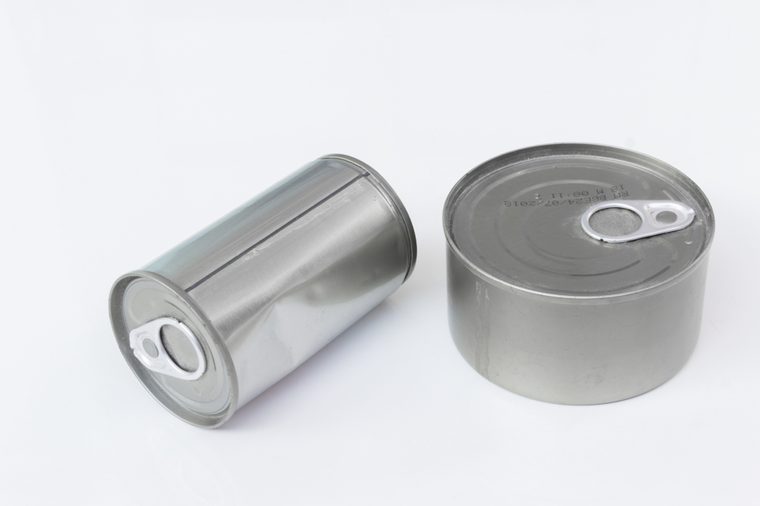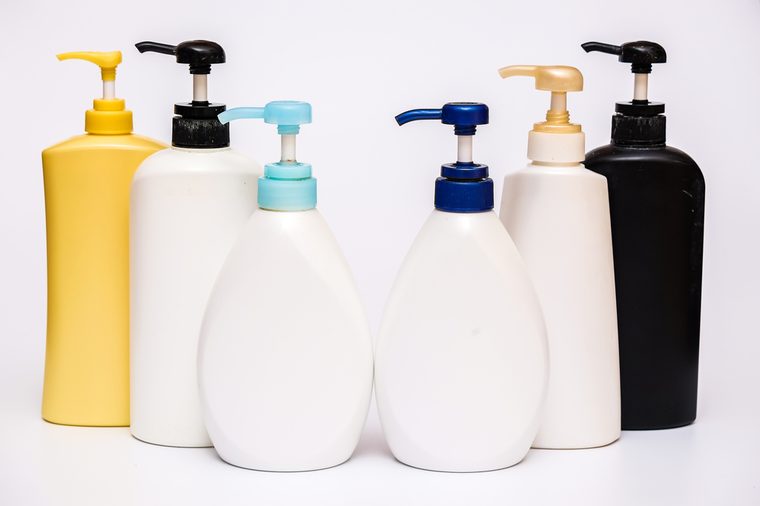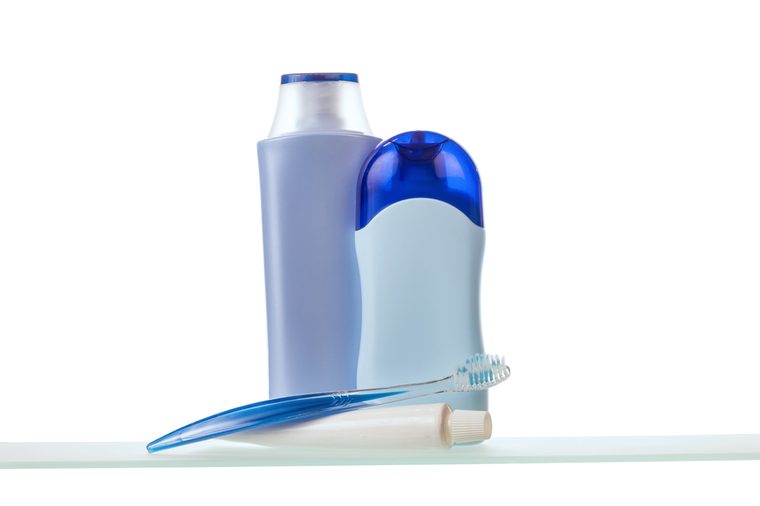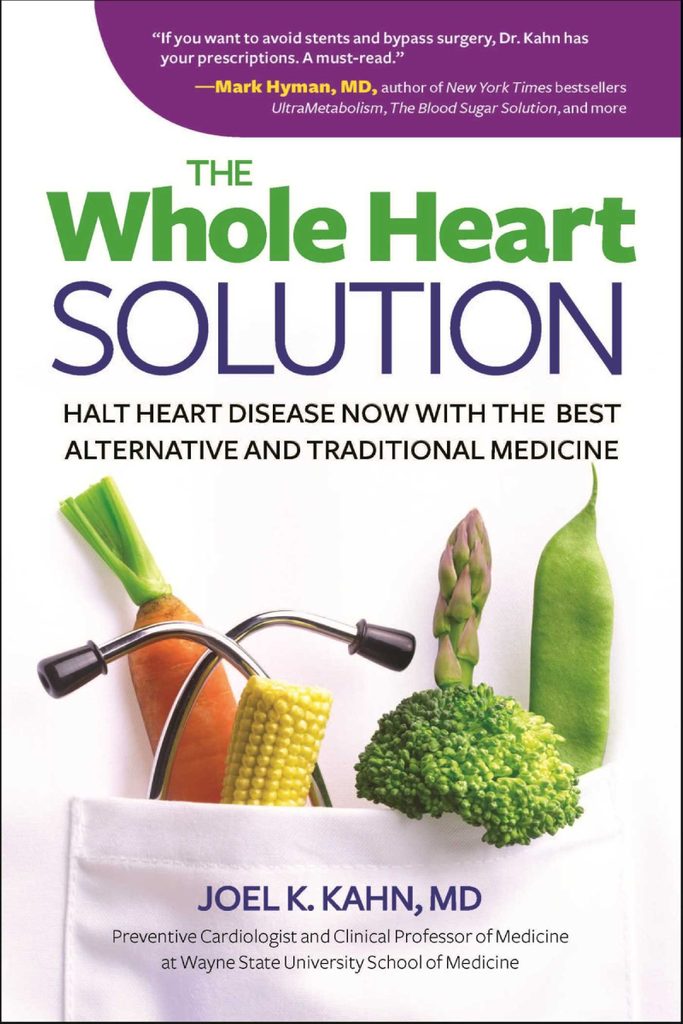
In canned goods and plastics, watch for: Bisphenol-A (BPA)
Sometimes called an endocrine disruptor because it interferes with the function of healthy hormones, BPA can mimic the effects of estrogen, increasing your risk of prostate and breast cancer and obesity. It may set the stage for heart disease too. One study linked high blood levels of BPA with an increased risk of dangerous types of plaque that are likely to rupture and cause sudden and often fatal heart attacks. When researchers from a number of different institutions looked at the levels of BPA in the urine of nearly 1,600 Brits and followed their health outcomes for 10 years, they found that people who developed heart disease were more likely to have elevated levels of BPA in their urine.
Solution: Buy canned food and water bottles marked BPA-free. Don’t touch sales receipts printed on thermal paper.

In toiletries, watch for: Phthalates
Phthalates are another type of endocrine disruptor linked to lower sperm counts, birth defects, obesity, and diabetes. Phthalates can be used in the manufacture of soft, flexible plastics used to make things like toys and bottles, but they’re also found in many personal care products, including nail polish, hair sprays, aftershave lotions, soaps, shampoos, and perfumes. One study linked high blood levels of a certain type of phthalate metabolite to an increased risk of hardened, clogged arteries. Recently, high blood pressure in children has been linked to phthalate exposures. More than 50 medical papers link phthalates to cardiovascular issues.
Solution: Avoid scented lotions and other personal care items.

In non-stick pans, watch for: Perfluorinated chemicals (PFCs)
These chemicals, also found in water-resistant coating on clothes and furniture can affect thyroid function, sperm quality, and kidney health, as well as heart disease. In a recent Danish study of 500 children found that overweight children who had higher levels of certain PFCs in their blood were more likely to develop risk factors linked to heart disease and diabetes, including higher levels of insulin and triglycerides. The findings were the same for normal-weight children.
Solution: Avoid treated products.

In clothing, furniture, and carpet, watch for: Polybrominated Diphenyl Ethers (PBDEs)
New furniture, carpeting, and mattresses are created with dozens of different chemicals. Think about the smell of new carpeting or of a new mattress. It comes from chemical fumes that are escaping. One such type of chemical is PBDE, which mimics thyroid hormones and can lead to lower IQ.
A few years ago, a team of Danish and Swedish scientists measured certain markers of health in 21 healthy, elderly couples while the couples performed their normal routines at home. Then for two more days, the researchers measured the same health markers but filtered the air inside the homes. The air filters removed up to 9,000 particles per cubic centimeter from the air in each home, resulting in a near immediate 8 percent improvement in the function of small blood vessels. This could be enough to lower blood pressure, reduce angina pain, or improve blood flow.
Solution: Use a HEPA filter vacuum cleaner and buy organic cotton clothing, furniture, mattresses, and other products when you can.

In dry cleaning, watch for: Perchloroethylene (Perc)
Great at removing stains, perc also protects clothes against shrinking, evaporates quickly, and can be reused over and over again, making it very cost effective. That’s why as many as 85 percent of dry cleaners use it as their primary solvent. But it comes at a price. The chemical is a liquid at room temperature but evaporates easily into air, where it can be washed out with rain and get into soil and ground water. Exposure to this chemical results in dizziness, fatigue, headaches, and nausea. It has been shown to cause cancer in rats and mice and is rated “probably carcinogenic to humans” by the International Agency for Research on Cancer (IARC). The relationship to heart disease is not yet certain, but the toxic effect of perc on important enzyme systems including the liver is concerning.
Solution: Take the plastic off your dry cleaning and air it out for a few days before you wear it. And drink filtered water.

On fruits and vegetables, watch for: Pesticides
More than 400 chemicals are regularly used to kill weeds, insects, and other pests. Conventional produce may have 90 times the pesticide content of organic produce. When researchers from Uppsala University in Sweden took blood samples from more than a thousand elderly Swedes, analyzed them for pesticides, and compared those levels to existing heart disease, they arrived at rather disturbing findings. People with more pesticides in their blood were at a higher risk for clogged arteries, and this was true regardless of their age, weight, blood pressure, and other health habits.
Solution: Organic fruits and vegetables are your best bet for avoiding pesticides altogether. But if you can’t afford to go organic, buy conventionally grown fruits and veggies that are least likely to contain pesticide residues like cabbage, cantaloupe, and eggplant, thoroughly wash your produce. This is the best way to clean pesticides off fruit.

In all meats, watch for: AGEs
All meats—no matter what kind of animal they come from—are natural sources of substances called advanced glycation end products (AGEs), also known as glycotoxins. AGEs are some of the chemicals most dangerous to the human body because they literally age you, causing stiff muscles, wrinkles, inflammation, stiffened blood vessels, and high blood pressure. Our bodies have natural defense mechanisms to handle AGEs, but they work slowly. Over time, if too many AGEs come in and not enough go out, they build up, causing premature aging. You can send levels of AGEs sky high with the wrong cooking method. For example, dry heat in searing, roasting, and grilling accelerates the formation of AGEs by 10 to 100 times.
Solution: Swap out searing, roasting, and grilling your meat for boiling, braising, or steaming. Cook for shorter times at lower heat. And if you grill, marinate your meat before and during cooking because moistened meats produce less AGEs than dry meats.

In antibacterial soap, deodorant, and toothpaste, watch for: Triclosan
This antibacterial agent is another endocrine disruptor much like phthalates. Triclosan was ubiquitous in personal care products prior to September 2016, when it was banned from soap products following a risk assessment by the US Food and Drug Administration (FDA), which found that household use of antibacterial products has absolutely no benefits over plain soap and water. The risks far outweighed the benefits, as this study showed even moderate triclosan exposure significantly reduced the muscular strength and cardiac function among mice, and slowed the swimming pace of fish.
Solution: If you come across any products still labelled “antibacterial,” avoid them. Consult the Environmental Working Group’s consumer database, Skin Deep, to find learn if products you are using contain triclosan or triclocarbon, its chemical cousin.

More Heart-Healthy Fixes
In the book The Whole Heart Solution, integrative cardiologist Joel K. Kahn, MD, reveals 75 simple ways to dramatically improve your heart health—from eating well to reducing stress to eliminating toxins. Learn more about the book here.